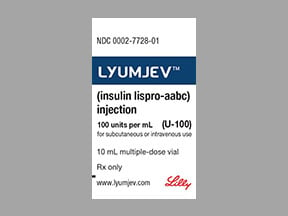
Lyumjev Coupons & Savings Card – Discount Prices from $93.91
My prescription
Edit
10ML of 100UNIT/ML, Lyumjev (1 Vial)
Select pharmacy

CVS
$106.55
COUPON PRICE
Albertsons
$93.91
COUPON PRICE
Walmart
$266.15
COUPON PRICE
Walgreens
$277.14
COUPON PRICELyumjev savings card
Show this card to your pharmacist
Albertsons
$93.91
BIN
ID
PCN
GRP
019876
LH5E634FF5
CHIPPO
LHX
Powered by
Related insulins prescriptions
More prescriptions for diabetes type 2
Related insulins prescriptions
More prescriptions for diabetes type 2
Price history for Lyumjev
1 Vial, 10ML of 100UNIT/ML
Average retail price for Lyumjev
Average SaveHealth price for Lyumjev
Our price history data is based on aggregated prescription data collected from participating pharmacies in America. Our prescription data updates daily to reflect the latest price changes. If you notice a missing data point, it means there wasn't sufficient data available to generate a monetary value for that date.
*Retail prices are based on pharmacy claims data, and may not be accurate when we don't have enough claims.
Lyumjev dosage forms
Dosage Quantity Price from Per unit 10ML of 100UNIT/ML 1 Vial $93.91 $93.91 10ML of 100UNIT/ML 2 Vials $172.82 $86.41 10ML of 100UNIT/ML 3 Vials $251.74 $83.91
| Dosage | Quantity | Price from | Per unit |
|---|---|---|---|
| 10ML of 100UNIT/ML | 1 Vial | $93.91 | $93.91 |
| 10ML of 100UNIT/ML | 2 Vials | $172.82 | $86.41 |
| 10ML of 100UNIT/ML | 3 Vials | $251.74 | $83.91 |
How is Lyumjev different from Humalog?
Lyumjev and Humalog are both rapid-acting insulin analogs used to control blood sugar levels in people with diabetes. The primary difference between the two is in their formulation. Lyumjev contains additional ingredients, such as treprostinil and citrate, which help it to be absorbed more quickly into the bloodstream, leading to a faster onset of action compared to Humalog. This allows Lyumjev to more closely mimic the body's natural insulin response to meals.
Is Lyumjev the same as Novolog?
Lyumjev and Novolog are not the same, although both are rapid-acting insulin analogs used to control blood sugar levels in people with diabetes. They have different formulations and may have different onset and duration of action. It is important for patients to follow their healthcare provider's instructions regarding which insulin to use and how to administer it.
What is the generic name for Lyumjev?
The generic name for Lyumjev is insulin lispro-aabc.
What are the issues with Lyumjev?
Lyumjev, a rapid-acting insulin, may have some potential issues or side effects. Common side effects include hypoglycemia (low blood sugar), allergic reactions, injection site reactions, and weight gain. Some patients may experience skin thickening or pits at the injection site. It's important for patients to monitor their blood sugar levels closely and consult their healthcare provider if they experience any adverse effects or have concerns about their insulin therapy.
Why does Lyumjev cause weight gain?
Lyumjev, like other insulin products, can cause weight gain as a side effect. This occurs because insulin helps the body store glucose, which can lead to an increase in fat storage. Additionally, improved blood sugar control with insulin therapy can lead to weight gain as the body starts to utilize glucose more effectively. It is important for patients to discuss any concerns about weight gain with their healthcare provider, who can offer guidance on managing this side effect.
